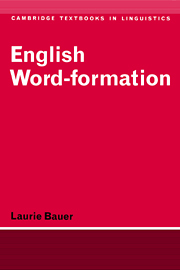Book contents
- Frontmatter
- Contents
- Dedication
- Preface
- 1 Introduction
- 2 Some basic concepts
- 3 Lexicalization
- 4 Productivity
- 5 Phonological issues in word-formation
- 6 Syntactic and semantic issues in word-formation
- 7 An outline of English word-formation
- 8 Theory and practice
- 9 Conclusion
- Bibliography and citation index
- Index
- Frontmatter
- Contents
- Dedication
- Preface
- 1 Introduction
- 2 Some basic concepts
- 3 Lexicalization
- 4 Productivity
- 5 Phonological issues in word-formation
- 6 Syntactic and semantic issues in word-formation
- 7 An outline of English word-formation
- 8 Theory and practice
- 9 Conclusion
- Bibliography and citation index
- Index
Summary
Though many things are possible in morphology, some are more possible than others.
(Aronoff, 1976: 35)The linguist who neglects this particular factor [productivity] will be counting “dead souls” as live people.
(Marchand, 1969: 5)Preliminaries
The existence of productivity
So far it has been implicit that word-formation is productive, but this position has not been argued for. In fact, it is probably not controversial to claim that it is productive: most authorities in the field make this assumption. Nevertheless, productivity remains one of the most contested areas in the study of word-formation, and several articles and books have been written specifically on this area. This is not because there is dispute over whether particular processes of word-formation are productive; the dispute concerns the extent to which word-formation can be said to be productive in general. It is to this dispute that the major part of this chapter will be devoted.
It is worth reiterating that certain processes of word-formation, at least, are clearly productive. In German, any infinitive can be used as a noun, independent of whether it has previously been used that way or not. In English, -er can be added to any new verbal base to give a new lexeme which means ‘the person who carries out the action of the verb’. Also in English the suffix -ful can be added to the name of any container to provide a noun: cartful, pocketful, skipful, etc.
- Type
- Chapter
- Information
- English Word-Formation , pp. 62 - 100Publisher: Cambridge University PressPrint publication year: 1983

